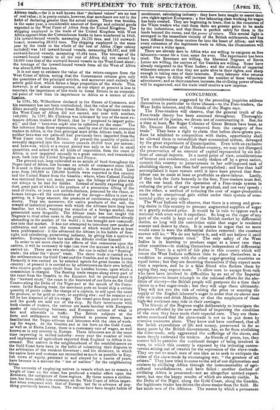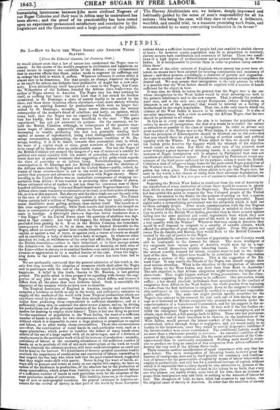CONCLUSION.
THE considerations suggested by the preceding inquiries address themselves in particular to three classes—to the Free-traders, the West India interest, and the friends of the Negro race. The Free-traders will observe, that the general truth of the Free-trade theory has been assumed throughout. Thoroughly convinced of its justice, we dream not of controverting it. But, for a time at least, The Sugar Colonies of Great Britain have been, as Mr. Deacon Hume said, removed from the category of free trade." They have a right to claim that before slave-grown pro- duce be admitted to competition with theirs, opportunity shall be allowed them to reestablish their economical system, deranged by the great experiment of Emancipation. Even with an exclusive eye to the advantage of the Mother-country, we may not disregard the preservation of an amount of capital represented by six mil- lions of annual imports. In a moral point of view, considerations of honour and consistency, not easily shaken off by a great nation, commit this country to perseverance in her self-imposed task of abolishing slavery, less than half accomplished; and less than half accomplished it must remain until it have been proved that free- labour can be made at least as profitable as slave-labour. Lastly, if they look the facts honestly in the face, Free-traders must feel, on the one hand, that the operation of a Free-trade system in reducing the price of sugar must be gradual, and not very speedy ; on the other, a method of reducing the cost of sugar-production must be an unequivocal gain either under their system of com- mercial policy or any other.
The West Indians will observe, that there is a strong and grow- ing desire in this country to procure augmented supplies of sugar at a greatly reduced price. It would be in vain to oppose such a national wish even were it expedient. So long as the sugar of any part of the world is kept out of the British market by differential duties, so long will the conviction exist that sugar is rendered scarcer and dearer by them. It is useless to argue that no more would come in were the differential duties removed : the constant answer will be, " We do not believe it, and will not believe it until we see the experiment tried." The only safety of the West Indies is in learning to produce sugar at a lower rate than other countries—in making themselves independent of differential duties. There is a spirit of fair play in this country which will insure the West Indians sufficient time to place themselves in a condition to compete with the other sugar-growing countries on equal terms; but they are deceiving themselves if they expect more than a reprieve, and he is a false friend who flatters them by saying they may expect more. To allow men to escape from ruin who have been involved in difficulties by an act of the Imperial Legislature—to insure triumph to the national efforts for the abo- lition of slavery—the British people will postpone for a time their claims to a free sugar-trade ; but they will urge them ultimately. They will not run the risk of raising the price or scanting the supply of the English labourer's sugar in order that ex-slaves may ride on mules and drink Madeira, or that the employers of those high-fed workmen may ride in their carriages.
The friends of the Negroes ought deliberately to investigate the prospects afforded by the new method of improving the condition of the race they have made their especial care. They are them- selves convinced that the slave-trade is not to be put down by coercive measures alone. They know and have confessed, that all the lavish expenditure of life and money, persevered in for so many years by the British Government, has, so far from abolishing the slave-trade, only aggravated the sufferings of the slaves, and more deeply embruted the traders. As friends of peace, too, they cannot fail to perceive the continual danger of being involved in wars, to which this country is exposed by the irritating contro- versies arising out of treaties for the repression of the slave-trade. They are not so much men of one idea as to seek to extirpate the crime of the slave-trade by encouraging war, "the greatest of all crimes." The) have tried to come to the aid of our diplomatists and cruisers by civilizing Africa through the instrumentality of agri- cultural establishments, and have failed : another method of civilizing Africa is presented—not an altogether untried experi- ment, but one the happy results of which are already visible. In the Delta of the Niger, along the Gold Coast, along the Gambia, the legitimate trader has driven the slave-trader from the field. He has made men of the Africans. The means by which a permanent humanizing intercourse between I the more civilized Negroes of our Sugar Colonies and their race in Africa may be maintained has been shown; and the proof of its practicability has been rested upon an experiment pronounced aatisfactory and conclusive by the Legislature and the Government and a large portion of the public.
The Slavery Abolitionists are, we believe, deeply impressed and habitually guided by the sense of man's responsibility for all his actions : this being the case, will they dare to refuse a deliberate, watchful, and candid trial, to a measure promising such fruits, and recommended by so many concurring testimonies in its favour ?



















































 Previous page
Previous page